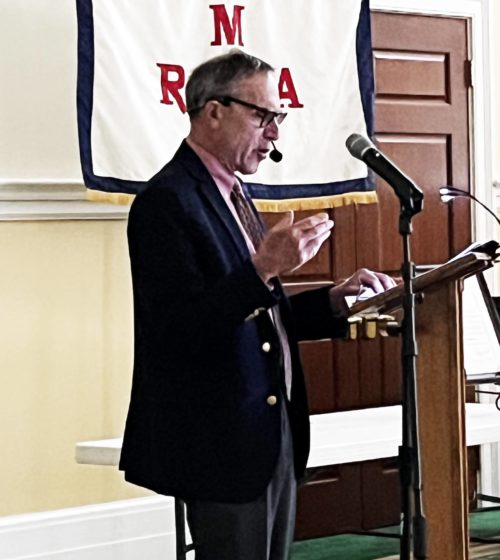By Jim Dean

At the May 31 meeting of the Greenwich Retired Men’s Association, Bob Rimmer introduced the speaker, Howard Husock, Senior Fellow and contributing editor for the City Journal of the Manhattan Institute. He spoke about his new book, “The Poor Side of Town: And Why We Need It. “
In his new book Husock combines a critique of more than a century of housing reform policies, including public and other subsidized housing, as well as exclusionary zoning. His idea is that simple, low-cost housing—a “poor side of town”—helps those of modest means build personal assets and join in the local democratic process. His is more a historical narrative than a straight policy book; he tells stories of Jacob Riis, zoning reformer Lawrence Veiller, anti-reformer Jane Jacobs, housing developer William Levitt and African American small homes advocate Rev. Johnny Ray Youngblood, in addition to first person accounts of one-time residents of neighborhoods such as Detroit’s Black Bottom, who lost their homes and businesses to housing reform and urban development.
However, this is a book with important policy implications based on personal stories. The book discusses individuals and institutions and the most effective ways to address poverty and narrow the widening gap between rich and poor in America. This is a gap that Husock feels is a grave threat to American democracy, although he would focus more on raising the lower end than bringing down the high end. He presented preventive strategies that he believes will be more effective than spending billions of American tax dollars for the vast array of government programs targeting various social issues.
The talk was followed by lively Q&A session.
Husock is the author of “Who Killed Civil Society? The Rise of Big Government and the Decline of Bourgeois Norms” and “Philanthropy Under Fire.” As a longtime print and television journalist and documentary filmmaker, his work for WGBH, Boston, won three Emmys. From 1987 to 2006 he served as director of case studies in public policy and management at the Harvard Kennedy School. He was a member of the board of directors of the Corporation for Public Broadcasting from 2013 to 2018. He is a graduate of the Boston University College of Communication and was a mid-career fellow at Princeton University Woodrow Wilson School of Public and International Affairs.
To see the full presentation, go to https://greenwichrma.org, cursor to “Speakers” and click on “Speaker Videos.”
The RMA’s upcoming presentation, “Endless Frontier: Vannevar Bush, Engineer of the American Century,” by G. Pascal Zachary, is scheduled for 11 AM on Wednesday, June 14th. In his book of the same title, Zachary describes the life and accomplishments of one of America’s most important engineers. Zachary has also edited and published “The Essential Writings of Vannevar Bush.” He will address the RMA via Zoom.
As President Roosevelt’s chief science advisor throughout WWII, Bush organized and directed more than 6,000 engineers and scientists to drive the innovation necessary to take the lead in the war. He helped to create what we now call the military-industrial complex, essential to ensuring the implementation of these innovations, and he oversaw the scientific development of the atomic bomb. He also fulfilled a promise to President Roosevelt to achieve in peacetime the scientific and engineering innovation that was accomplished during the war by conceiving and proposing in 1945 the establishment of the National Science Foundation, an institution that continues to serve us to this day. Additionally, in 1945 Bush published an article titled, “As We May Think,” describing the concepts and functionality of the personal computer.
Zachary is a writer and educator, concentrating on the history of technological change, national security and economic growth. He has taught at Arizona State University (2010-2020), Stanford University (2007-2009) and the University of California at Berkeley (2001-2002). He consulted on technology development for the Gates Foundation (2007-2009).
The National Science Foundation awarded him a grant to study the emergence of computer science as an academic discipline in East Africa. The Atlantic described Zachary as “one of the most insightful and creative thinkers on technology in Africa in the West.” He was a senior science writer for the Wall Street Journal from 1989 to 2002 and was a chief writer on Silicon Valley for The New York Times, The Atlantic, Technology Review, Wired, and Spectrum magazines.
Born in Brooklyn, Zachary lives in northern California with his wife, Chizo Okon, of Port Harcourt, Nigeria.
To stream the presentation by Mr. Zachary at 11 AM on Wednesday, June 14th, click on https://bit.ly/30IBj21. This presentation will also be available on local public access TV channels, Verizon FIOS channel 24 and Optimum (Cablevision) channel 79.
Note: The views expressed in these presentations are those of the speakers. They are not intended to represent the views of the RMA or its members.
RMA speaker presentations are presented as a community service at no cost to in-person or Zoom attendees, regardless of gender. The RMA urges all eligible individuals to consider becoming a member of our great organization, and thereby enjoy all the available fellowship, volunteer, and community service opportunities which the RMA offers to its members. For further information, go to https://greenwichrma.org/, or contact our membership chairman (mailto:members@greenwichrma.org).




